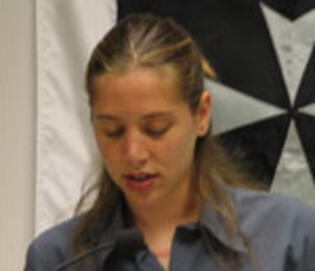
Creative Writing Award Winner - 2004
Class of 2006
Rebecca Lesser entered YSN with a background in Anthropology from Washington University in St. Louis where she graduated Summa Cum Laude. While a student, she was selected to study issues of culture, development and social justice for a semester in Brazil. Additionally, she interned with the Frontier Nursing Service in the Appalachia region of Eastern Kentucky, conducted survey research in urban San Francisco about the spread of Sexually transmitted diseases, and was a volunteer Medical Assistant in an emergency care clinic in Berkeley, California. She was trained as a Doula; a labor and delivery coach. and currently, Rebecca is a Registered Nurse studying midwifery.
Transcript of the Reading:
Witness
It has been three weeks and three days, and Donald still has not left me. His foul breath, bony legs and gentle tears have been on the edge of my mind ever since the last morning I cared for him.
On the day we met, Donald had known of his cancer diagnosis for one week. As I walked down the hall and into his room the first morning, armed with my clean sheets, towels and chlorine smelling new johnny, I thought about what it must feel to have just been told that you have cancer. Was Donald thinking about death, or illness, or breakfast? What does day seven of a diagnosis mean? Did he expect this? Does a smoker of 20 years expect this? Or, was it still shocking, like it would be for anyone else? I thought about his charts. His charts had said that he had gone to his opHthamologist for an eye exam. She had sent him to the hospital for a MRI. He had thought he had glaucoma. He was wrong.
We talked through his bed bath: about being a musician, living in California, if one can learn perfect pitch, how quickly bed sores can occur, and Dostoyevsky. His bony knees protruded from beneath the blanket as we spoke; I wondered what lay beneath. Pulling back the sheets, I saw Donald’s scrawny legs, bare on the bed–it was as if they were detached from his body. Reading my resting glance Donald explained, “I had polio as a child.”
I follow Donald down to his radiation treatment. He is pushed on a stretcher, while I walk behind. We talk about him. He is afraid of elevators. He met a man who wanted to teach him to hang glide. He met a lady with whom he lived and loved for awhile. He finds it slightly absurd to be diagnosed with stage IV lung cancer and still be afraid of elevators. He played jazz in the bars of San Francisco and New York City. As I watch him tell me this story, I see him transformed. The man sitting in front of me, shiny bald head, thick glasses, rotting teeth, emaciated legs, becomes the man in the story: black beret, black turtleneck, plucking at his base–he jokes with guys in the band; he is respected as the tender, witty musician he is.
Now, Donald has few friends, not wanting to make his burdens theirs. He has a brother across the country in California, “who is busy with his own life.” He shops, cooks and cleans for himself. He has taken up painting as a hobby. He has learned to embrace love and make do with loneliness unlike any other human being I have encountered. We talk about getting sick, about what will happen when he is not able to care for himself. He tells me he is scared that being terminally ill will mean that he is not a productive member of society. Removing his thick glasses to wipe away the tears he says, “I just hope they don’t throw me away.”
My shift is over. It is time to leave. I do not know how to say goodbye to a man who has just told me that he does not want to die of cancer with a toothache, and could I “please call the dentist.” Fumbling, I wish him the best of luck, and he calls me a lady and a scholar as I walk out the door. I know he most likely will not be there when I return next week.
At times, to be a nurse is to be a witness. By hearing Donald’s story, I was his witness. I witnessed His gentleness and compassion, that he loved the world and his life, and that he had fears and desires. I witnessed his existence, and in return, he honored mine.
